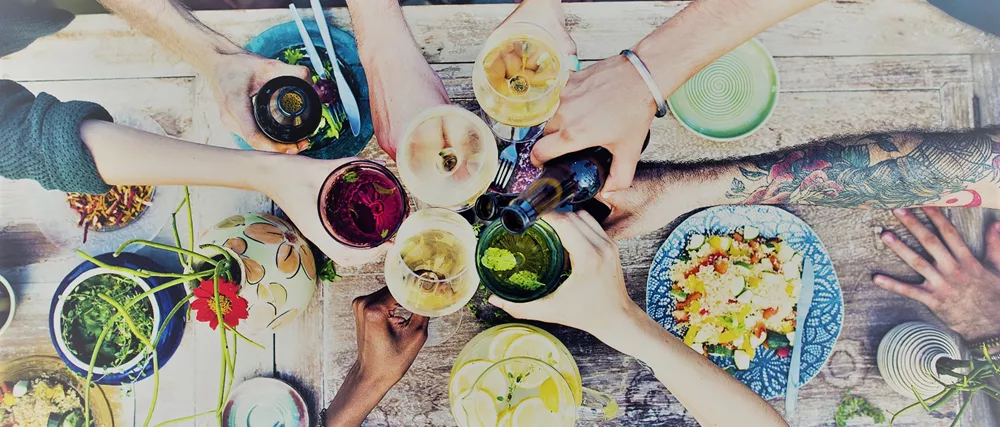The food and drink sector is serious business. With an expected global population of over 9 billion by 2050, estimates suggest we're going to need upward of a 60% boost to our current total food production to keep the world fed. We're also going to have to get to grips with the issue of food quality along the way. A third of the global population now classifies as either obese or unhealthily overweight. Meanwhile, every stage of food and drink production needs to tackle the problem of sustainability, from eliminating water wastage to breaking our deadly dependency on single-use plastics. The challenges are immense, but the food and drink industry is rising to meet them with new products, new processes and new principles. There will inevitably be stumbles and obstacles along the way, but that vital spirit of innovation is alive and well in the sector.
Key trends
Many of the real innovations transforming the industry stem from a revolution in the field of plant-based foods. Research has shown that there's a huge amount of barely explored potential in these healthier alternatives to animal products, and consumers are more than willing to "branch out" into plant-based diets as long as their expectations in terms of taste, texture and pricing can be met. Meadow Foods, for example, is using bespoke blends of oats and rice to produce plant-based substitutes for animal products from yoghurts to custards that match taste and texture like-for-like.
Meanwhile, with healthier options to existing products still very much in the spotlight, low-alcohol and alcohol-free drinks are also seeing a significant uptick. Again, this is being driven by rising demand and fulfilled through innovation, with an anticipated growth in sales of these alternative beverages of over 31% by 2024.
Looking beyond basic ingredients, we're seeing some highly innovative thinking in food presentation and marketing. Understanding the potential of the Coachella event, drive-in restaurant Sonic ditched the standard "pop-up" store format to experiment with square-shaped shakes ideal for sharing via Instagram, with a convenient "Shop Now" button and geo-fence arrangement allowing festival attendees to order directly from the platform.
Innovation, of course, is about much more than developing new products, and recent years have seen an explosion in "experience-based" concepts in the food and drink sector. From Bombay Sapphire's inventive exploration events, which promise a "journey of gin discovery", to Campari's masterclass narrowboat experience, Campari Creates, which allows visitors to devise their own cocktails and immerse themselves in the brand's history.
Getting even more technical, we have Brandless, whose innovative use of analytics allows them to turn data on existing and emerging consumer habits into workable plans for low-cost, low-waste products of their own. Meanwhile, New York's Farther Farms is building new technologies to repurpose supercritical carbon dioxide into a natural pasteurisation process, resulting in a 70% reduction in energy use during processing and distribution.
Delving even deeper into science-fiction territory, Tokyo's Tree by Naked describes itself as a virtual reality restaurant, leading diners on a narrated journey through life itself, complete with light shows, wind machines and carefully crafted soundtracks. Alternatively, for the safety-conscious foodie, Allergy Amulet has developed a food allergen detector designed to alter the user to potential dangers lurking on their plates. All this, and we haven't even touched on Garlidoux's natural garlic paste, designed to eliminate "garlic breath" without compromising on flavour or health benefits.
Innovation and sustainability
We've talked a little about this already, but sustainability really is the defining challenge facing all sectors right now. With Coca-Cola alone producing 3 million tonnes of plastics per year, the race is on to find better options and make better choices. Some significant developments are being made already, such as Lucozade Ribena Suntory's partnership with packaging start-up Notpla. Their Ooho drinks capsule is plastic-free, biodegradable and, being derived from seaweed, actually edible itself.
Sometimes, tackling the problem of waste presents new solutions of its own. Toast Ale, for example, is using the discarded "heel ends" of bread loaves otherwise discarded by sandwich makers to reduce their need for barley by a third. At the same time, West Dorset's Black Cow vodka is repurposing unneeded whey from local cheese production. Waste, it seems, is in the eye of the beholder. With proper handling and a little innovation, it can be redefined as a product, part of a new process or even simply a source of energy.
When innovation doesn't bear fruit
Not every adventure into R&D is going to pay off. That's an accepted - even essential - part of the process. Consider the ill-fated Juicero - a machine that created healthy drinks from prepared sachets of fruits and vegetables. It was intended as a convenience for the health-conscious consumer. However, the cost, its need for wifi connectivity and restrictions against home-made ingredient packets meant it never found a place in the market. A similar fate befell Teforia, a tea brewer brimming with smart technology. The need for an app and a four-figure price tag failed to convince tea enthusiasts that they were getting anything useful for their money. Speaking of apps, how does the ability to order drinks over your phone to avoid long waits at the bar sound? Flowtab offered exactly that, syncing with the venue's POS terminal and accepting payments. Sadly, the business never found a workable business model to make the idea profitable.
All of these noble failures matter because, even if your innovations never bear fruit, they still qualify for tax relief. We all stand on the shoulders of giants, and even failed projects contribute to our collective knowledge and help push back boundaries. If you aren't missing at least some of the shots you take, then you aren't aiming high enough.
If you're in the business of breaking through barriers and pushing back boundaries, whether in the food and drink sector or elsewhere, you could be due invaluable R&D Tax Relief. We can help you identify historic qualifying activity and get the credit you deserve - Get In Touch | Contact Us | RIFT R&D (riftresearch.com)

